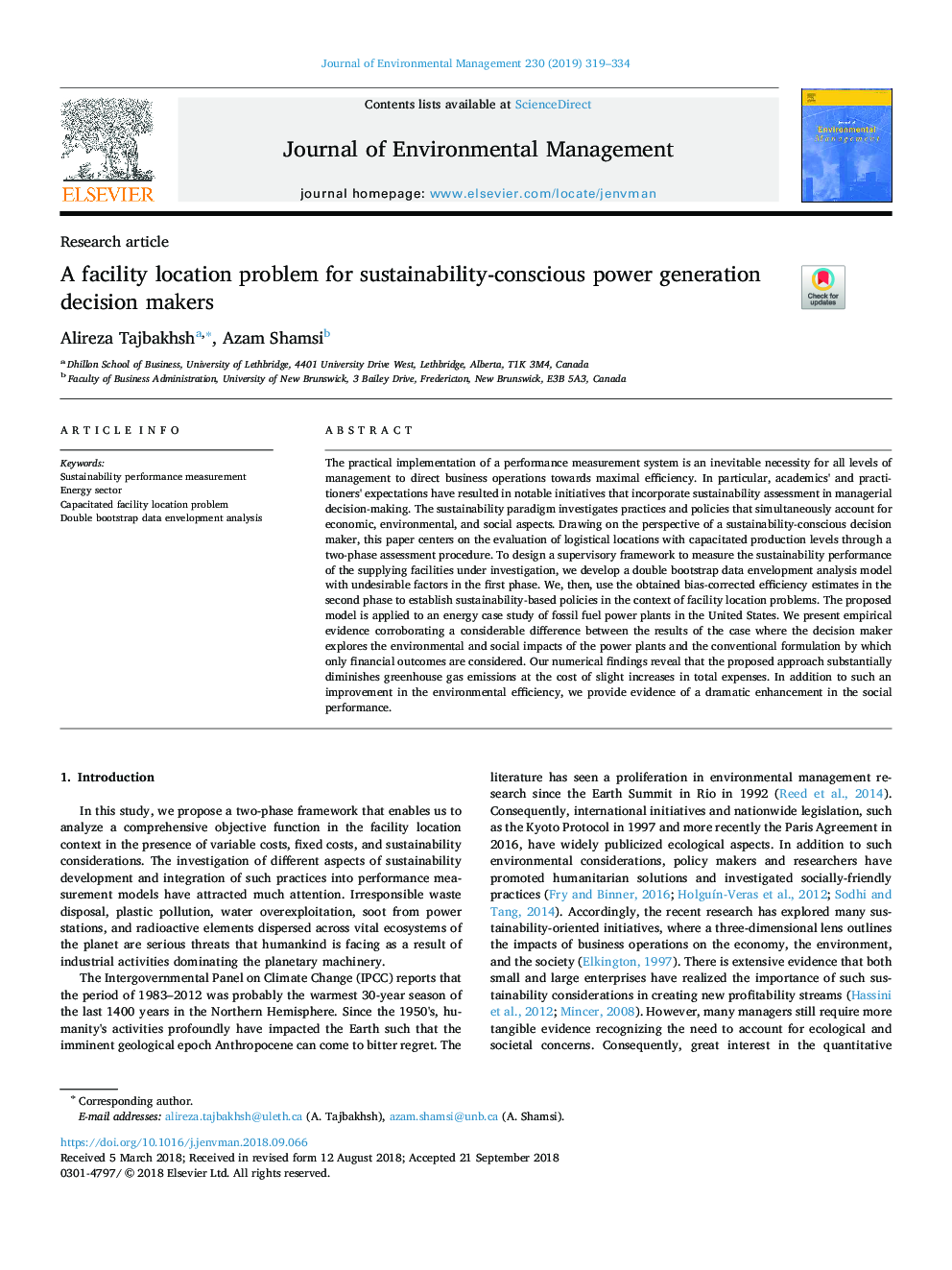| کد مقاله | کد نشریه | سال انتشار | مقاله انگلیسی | نسخه تمام متن |
|---|---|---|---|---|
| 11023251 | 1701321 | 2019 | 16 صفحه PDF | دانلود رایگان |
عنوان انگلیسی مقاله ISI
A facility location problem for sustainability-conscious power generation decision makers
ترجمه فارسی عنوان
یک مشکل محل سکونت برای تصمیم گیرندگان تولید انرژی آگاهانه پایدار
دانلود مقاله + سفارش ترجمه
دانلود مقاله ISI انگلیسی
رایگان برای ایرانیان
کلمات کلیدی
اندازه گیری عملکرد پایداری، بخش انرژی، مشکل محل کارخانه ظرفیت تجزیه و تحلیل پوشش داده دو بوت استرپ،
ترجمه چکیده
پیاده سازی عملی یک سیستم اندازه گیری عملکرد یک ضرورت اجتناب ناپذیر برای تمام سطوح مدیریت است تا عملیات تجاری را به سمت حداکثر کارایی هدایت کند. به طور خاص، انتظارات دانشگاهیان و تمرینکنندگان منجر به طرح های قابل توجهی شده است که ارزیابی پایداری در تصمیم گیری های مدیریتی را شامل می شود. پارادایم پایداری بررسی شیوه ها و سیاست هایی است که به طور همزمان برای جنبه های اقتصادی، زیست محیطی و اجتماعی حساب می شود. با توجه به دیدگاه تصمیم گیرنده درمورد پایداری، این مقاله بر مبنای ارزیابی مکان های لجستیکی با سطوح تولید ظرفیت با استفاده از یک روش ارزیابی دو مرحله ای می باشد. برای طراحی یک چارچوب نظارتی برای اندازه گیری عملکرد پایدار تأسیسات تأمین شده تحت بررسی، ما یک مدل تحلیل پوششی اطلاعات دو بوت استرپ با فاکتورهای نامطلوب در مرحله اول را توسعه می دهیم. پس از آن، ما از فواصل کارآزمایی تصحیح شده تعصب حاصل شده در مرحله دوم استفاده می کنیم تا سیاست های مبتنی بر پایداری را در زمینه مسائل مربوط به محل سکونت تاسیس کنیم. مدل پیشنهادی به مطالعه موردی انرژی نیروگاه های سوخت فسیلی در ایالات متحده اعمال می شود. شواهد تجربی شواهد نشان می دهد که اختلاف قابل توجهی بین نتایج موردی وجود دارد که در آن تصمیم گیرنده به بررسی اثرات زیست محیطی و اجتماعی نیروگاه ها و فرمول های متعارف که تنها نتایج مالی آنها در نظر گرفته می شود. یافته های عددی ما نشان می دهد که روش پیشنهادی به طور قابل توجهی کاهش انتشار گازهای گلخانه ای را با هزینه های کم هزینه های کل کاهش می دهد. علاوه بر چنین بهبودی در بهره وری محیطی، شواهدی از پیشرفت چشمگیر در عملکرد اجتماعی ارائه می کنیم.
موضوعات مرتبط
مهندسی و علوم پایه
مهندسی انرژی
انرژی های تجدید پذیر، توسعه پایدار و محیط زیست
چکیده انگلیسی
The practical implementation of a performance measurement system is an inevitable necessity for all levels of management to direct business operations towards maximal efficiency. In particular, academics' and practitioners' expectations have resulted in notable initiatives that incorporate sustainability assessment in managerial decision-making. The sustainability paradigm investigates practices and policies that simultaneously account for economic, environmental, and social aspects. Drawing on the perspective of a sustainability-conscious decision maker, this paper centers on the evaluation of logistical locations with capacitated production levels through a two-phase assessment procedure. To design a supervisory framework to measure the sustainability performance of the supplying facilities under investigation, we develop a double bootstrap data envelopment analysis model with undesirable factors in the first phase. We, then, use the obtained bias-corrected efficiency estimates in the second phase to establish sustainability-based policies in the context of facility location problems. The proposed model is applied to an energy case study of fossil fuel power plants in the United States. We present empirical evidence corroborating a considerable difference between the results of the case where the decision maker explores the environmental and social impacts of the power plants and the conventional formulation by which only financial outcomes are considered. Our numerical findings reveal that the proposed approach substantially diminishes greenhouse gas emissions at the cost of slight increases in total expenses. In addition to such an improvement in the environmental efficiency, we provide evidence of a dramatic enhancement in the social performance.
ناشر
Database: Elsevier - ScienceDirect (ساینس دایرکت)
Journal: Journal of Environmental Management - Volume 230, 15 January 2019, Pages 319-334
Journal: Journal of Environmental Management - Volume 230, 15 January 2019, Pages 319-334
نویسندگان
Alireza Tajbakhsh, Azam Shamsi,
